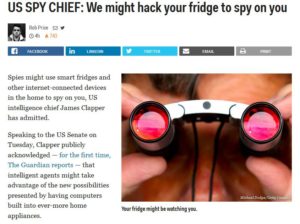How the NSA will check your refrigerator contents and why
Let me first state that I can’t think of a good reason why the NSA would do that. The important point is that with the upcoming introduction of a new technology, that they helped create, they can if they want. The real reason is in the nature of “The Internet of Things,” that is the ongoing addition of Internet visible devices in our homes.
As you know, companies are hacked all of the time. Just imagine if you have a house full of gadgets that are connected to the Internet. Those “things” are probably built to a tight budget and I expect fixed firmware. When the software flaws are discovered and quietly published, those things can be hacked.
When those things are hacked, as they are attached to your entire home computer network, you are done for. That’s the real reason why the NSA will be busy, not that they care what’s in your ‘fridge, but it could be the gateway to your home PCs.
As I’ve been in the computer business for over thirty years, I follow this market segment all day, all week and all the time. My specialty is VDI, SANs and data security. If I’m elected, I am sure to be on the House technology committee as well as others.
When the Internet was first developed by DARPA (our government), a group of engineers created a method of how military computers could communicate with each other, and be fault tolerant.
Fault tolerance means that if the electronic path between computers was broken, the computers would instantly develop another path. It is a computer language known as TCP/IP, or IP for short and published in 1981.
In other words, your computer or router has a unique global address that allows a computer anywhere in the world to talk to yours, if allowed. The current, soon to be obsolete, version of the IP language or protocol is version 4, known as IPv4.
Unfortunately, it also allowed hackers (and the NSA) to probe your computer for weaknesses and steal information. That’s why the anti-hacking, anti-virus, anti-malware market segment is such a good business for vendors.
The two key issues with IPv4 are lack of built in security and limited availability of unique numbers. When it was designed in the late 70’s, security wasn’t a big issue so that technology wasn’t built in. As over 4 billion unique IP addresses or numbers were available under IPv4, that was thought to be more than enough. It isn’t, any more, as the government developed technology is how vast numbers of commercial and public computers connect to each other. Everything you do on the Internet, or in your business uses IP numbers.
In 1996, engineers released a broad framework or design for the next version of this language called IPv6. It is just starting to be used commercially. It has two key features: an almost infinite number of IP numbers that can be assigned to computing devices, 340 trillion trillion trillion versus 4.3 billion with v4, and built in security notably using IPSEC(urity).
The advantage of this new numbering system is that almost every electronic device, not just computers can and will have an IP number. That includes your refrigerator. Why?
Because technology can assist in day to day life, even letting your next generation refrigerator send you messages when certain foods are below preselected levels and to allow for better energy efficiency.
The disadvantage with IPv6, at least that I’ll discuss here, is that IPSEC and other features were written, or added to by the NSA.
It was believed that the NSA could add tremendous value by advising the civilian engineers about “ironclad” security. Now, we all know better as it’s almost certain that the NSA and other government agencies have a “back-door” or secret access to view the “secure” messages and data traffic.
They will be able to snoop on anything and everything, while they compile dossiers on almost everybody on the planet! I’m not concerned with compiling dossiers on non-U.S. nationals, but I am with them doing so domestically.
Why? Because of what’s known as the Fourth Amendment to our Constitution.
As I wrote in my Yottabyte article, the NSA’s storage capacity is so huge (and growing) that they have the ability to store incredible amounts of information on everybody, including all U.S. citizens. They will.
This isn’t theory, especially as my SAN business uses the same storage technology that the NSA uses. It’s called ZFS. I am convinced that you and your children have electronic dossiers accessible in under a second by any agency with access rights, anywhere, anytime.
Apparently, our government hasn’t heard about the Fourth Amendment of our Constitution. Frankly, our alleged presidential constitutional legal scholar, and the NSA don’t care about that particular amendment. It’s a nuisance.
You may recall that the President Obama took an oath to uphold and defend the Constitution. I don’t think that it meant much to him, but he was obliged to say the words.
I do care about our constitutional framework. It is foundation of our nation. If you destroy or undermine the foundation, the house will collapse.
So although I don’t know why the NSA will be interested in checking your refrigerator contents, I’m sure that they can if they want and will.
If elected, I will work to reduce their funding if they continue to monitor U.S. citizens. This is the soft underbelly of the NSA. If they don’t have the budget, they won’t be able to ring fence the public in our surveillance society.
It doesn’t matter if you have nothing to hide; it will only matter if they think you do. There are many innocent people in prison, based on circumstantial evidence. Most had nothing to hide, as they didn’t do anything wrong, until government thought that they did.
I know that this is a dull topic, but it is an important one. Elect me and I’ll work on this all day, all week, and all the time.
————————————-
Editor’s note, February 10, 2016
Click on the picture to read the article.






